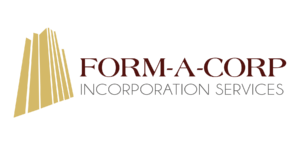1. What is a Corporation?
2. What is the Structure of a Corporation?
3. What are the Advantages of incorporation?
4. What are the Disadvantages of incorporation?
5. Do I need an Attorney to form a Corporation?
6. In which State should I incorporate my business?
7. How many Directors are necessary?
8. What is a Registered Agent and is one needed?
9. What is an S Corporation?
10. What is a Corporate Kit?
11. What is a Federal Employer Identification Number?
12. How do I begin the process of incorporating my business?
13. What is an Aged Company or Shelf Company?
14. What is a DBA, Fictitious Name, Tradename?
A corporation is a separate legal entity that exists independently from its owners. A corporation is created and comes into existence when articles of incorporation (charter or certificate of incorporation in certain states) are filed with the prescribed fees, and accepted by the proper state authority.
2. What is the Structure of a Corporation?
A corporation is owned by stockholders. While stockholders do not directly manage the corporation, they influence corporate decisions through indirect actions such as electing and removing directors, approving or disapproving amendments to the articles of incorporation and voting on important corporate decisions.
The members of the Board of Directors are responsible for managing the affairs of the corporation. Usually, directors make only major business decisions, however they supervise and appoint officers who make the day-to-day business decisions of the corporation.
Officers are responsible for the everyday management of the corporation. Typically, officers are appointed directly by the Board of Directors.
A stockholder may serve on the Board of Directors and also be an officer of the corporation. In fact, in most states one person is enough to form a corporation, and that person can be the sole officer, director and stockholder.
3. What are the Advantages of incorporation?
The most important advantage of incorporation is that it gives its stockholders limited liability. Since the corporation is a separate legal entity, its stockholders are protected from the debts and liabilities of the corporation.
Other advantages:
- A corporation has unlimited life. If an owner dies or sells his interest the corporation will continue to exist and do business.
- Ability to easily establish insurance and retirement plans.
- Ownership of corporation is easily sold or transferred through sale or transfer of stock.
- Capital can be raised through sale of stock.
- A corporation has centralized management which may remain in place after sale of business.
4. What are the Disadvantages of incorporation?
The primary disadvantage to incorporation is the possibility of double taxation. The profits of a corporation are taxed first as income to the corporation, then second as income to the shareholder. However, all reasonable business expenses such as salaries and other operating expenses are deductions against corporate income which can minimize double taxation. Double taxation can be eliminated by making an S Corporation election. S Corporations only pay taxes one time at the tax rate of the shareholder(s). S Corporations can deduct the same expenses as a C corporation.
- Complexity and expense of forming a corporation.
- Legal formalities involved with a corporation.
5. Do I need an Attorney to form a corporation?
No, an attorney is not a legal requirement of forming a corporation. However, certain knowledge is necessary in order to properly file the required documentation in the designated state of incorporation.
You can use our guaranteed services to form your corporation, and save a substantial amount of money you would otherwise pay an attorney. However, if you need legal or financial advice as to the type of entity which would best suit your business needs, consult your attorney or financial advisor.
6. In which State should I incorporate my business?
A corporation is not required to incorporate in the state in which it operates its business, however, it is usually best to incorporate in your home state.
Certain issues are involved when determining the proper state in which to incorporate your business. First, you must consider the costs of incorporating in your home state vs. the costs involved in qualifying as a foreign corporation in another state being considered. Second, you must determine the advantages and disadvantages of each state’s corporate laws and tax structure. Generally, it is considered best to incorporate in the state in which your business is operating.
7. How many Directors are necessary?
Generally, in most states a corporation is only required to have one director, however you are permitted to have more. Certain states base the required number of directors on the number of stockholders. If the corporation has 3 or more stockholders, then the corporation must have at least 3 directors. If the corporation has less than 3 stockholders, then the number of directors may be equal to or more than the number of stockholders. The states which have this rule are: CA, CO, CT, HI, LA, ME, MD, MA, MO, NY, OH, VT and UT.
8. What is a Registered Agent and is one needed?
In all states, an individual or service company must be responsible for receiving important legal and tax documents. This service is provided by an “agent” of the corporation who is “registered” with the state of incorporation. Thus, the term “Registered Agent.” The registered agent must have a valid street address within the state of incorporation, and be available during normal business hours to receive documents.
The services performed by a registered agent may include:
- Receiving and forwarding legal documents.
- Receiving and forwarding franchise tax and annual report forms.
- Accepting and forwarding service of process.
An S Corporation is merely a corporation which has elected a special tax status. This tax treatment permits the income of the corporation to be treated like the income of a partnership or sole proprietorship in that the income is “passed through” to the shareholders. Thus, shareholders report the income or loss which is generated by an S Corporation on their individual tax returns. Under these circumstances the “double taxation” potential is avoided.
In order to be considered an S Corporation, the stockholders of a properly filed corporation must elect such status within 75 days of formation for the current tax year, or at any time during the preceding tax year. This election is made by filing Form 2553 with the IRS.
To qualify for S Corporation status:
- Must be a domestic corporation.
- Only one class of stock.
- Not more than 35 stockholders.
- Stockholders must be individuals, estates or certain trusts.
Once a corporation has been legally formed and is ready to complete its organization, it will require a “Corporate Kit” to maintain certain of its required records and facilitate stock distribution.
The corporate kit will include:
- Corporate Seal.
- Stock Certificates.
- Stock Transfer Ledger.
- Sample Minutes and By-Laws.
- Minute Book/Binder.
- Miscellaneous Forms.
A Corporate Seal is a small press into which a document is placed to be embossed. The imprint made by the seal indicates the corporation’s name, state of incorporation and date of incorporation. Corporate seals were at one time required by all states, but are presently optional in some states. However, an impression made by a corporate seal helps to conveys the mark of authority upon business documents.
A Stock Certificate is a printed document used to indicate ownership of shares of the corporation. The corporate kit supplied by Form-A-Corp contains 20 custom-printed stock certificates which may be issued at the discretion of the corporation.
The Stock Transfer Ledger contains a record of the number of shares which have been issued by the corporation, as well as the dates of issuance, stock certificate number and the person or entity to whom the shares were issued.
Most kits contain sample Minutes and By-Laws to be used as a guide or reference for proper record keeping. Minutes are written records of meetings of the Board of Directors or stockholders which document what has transpired during such meetings. It is extremely important for the corporation to maintain these records in order to prove the existence and validity of the corporate entity.
11. What is a Federal Employer Identification Number?
Once the corporation has been formed and is ready to do business, it is the time to apply for a federal employer identification number (EIN). Generally, any corporation doing business within the U.S. is required to have an EIN. In fact, the EIN is necessary when filing tax returns and for establishing bank accounts.
A corporation can receive an EIN by completing and submitting IRS Form SS-4. However, you can have Form-A-Corp save you this tedious and time consuming paperwork by completing and submitting the necessary EIN form on your behalf.
12. How do I begin the process of incorporating my business?
Once you have decided the type of business entity which is best for your business, articles of incorporation must be filed with the proper state agency together with certain fees.
Form-A-Corp will provide all necessary services to ensure that the administrative processes are completed in the shortest period of time, with the highest degree of skill and efficiency.
After the articles of incorporation are filed and accepted by the designated state, your corporation must hold an organizational meeting at which acts taken and resolutions adopted by the incorporation director are approved and recorded, corporate seal is approved, shares of stock are distributed and officers elected. The necessary record keeping material, corporate seal and stock certificates are all included in Form-A-Corp’s corporate kit.
13. What is an Aged Company or Shelf Company?
A shelf corporation, shelf company, or aged corporation, is a company or corporation that has had no activity. It was created and left with no activity – metaphorically put on the “shelf” to “age”. The company can then be sold to a person or group of persons who wish to start a company without going through all the procedures of creating a new one. To inquire about our inventory of aged shelf companies, please use the Additional Service tab from our Home Page to submit your request.
14. What is a DBA, Fictitious Name, Tradename?
The phrase “doing business as” (abbreviated DBA, dba, d.b.a. or d/b/a) is a legal term used in the United States and Canada, meaning that the trade name, or fictitious business name, under which the business or operation is conducted and presented to the world is not the legal name of the legal person(s) who actually owns the business and is responsible for it.
The distinction between an actual and a “fictitious” name is important because businesses with “fictitious” names give no obvious indication of the entity that is legally responsible for their operation. Fictitious names do not create legal entities in and of themselves; they are merely names assumed by existing persons or entities. In some jurisdictions, when a businessperson writes a trade name on a contract, invoice, or check, he or she must also add the legal name of the business.



